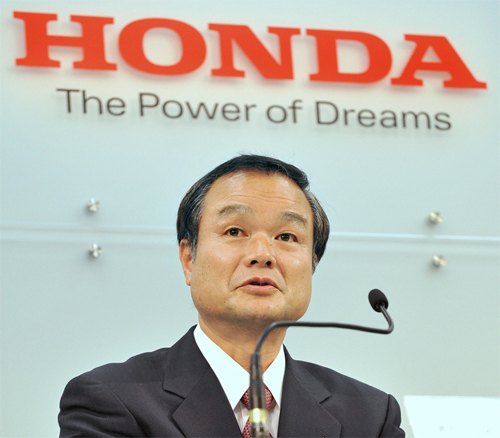Honda On Direct Injection: Don't Wait For It; We Have Other Priorities

Last week, in our post on Hyundai’s new DI (Direct Injection) Theta II engine, we questioned Honda’s long-standing engine technology leadership. We also assumed (wrongly) that they would be joining the DI club shortly, given the advantages DI technology affords. Turns out we weren’t the only ones wondering, except that in the case of auto, motor und sport, they weren’t asking it rhetorically, but the person in the know: Honda CEO Takanobu Ito. In an interview with Europe’s leading car magazine (print edition), Ito gave DI a pass with his answer to the question: “Honda was once the leader with its internal combustion engines. Did your competitors overtake you with gasoline Direct Injection?”
We have limited resources, and we are concentrating on Hybrids. We want to build the optimal engines for hybrids. And if we’re going to talk about hybrids, we have to talk about the costs for the consumer. Hybrids are very expensive. The fact that our hybrids (Insight) are selling so well in Japan is because of government incentives.
Well, the part about why the Insight is selling well in Japan was refreshingly candid, given its poor sales in the US versus the Prius. Ito goes on to share the dilemma facing Honda (and presumably others) in dealing with tightening efficiency demands and expectations:
One option would be to make cars smaller and lighter. But the consumer will not accept any compromises in comfort. So given the demands to reduce CO emissions and the expectations of continued gas price increases, adopting hybrid technology (further) is simply easier.
Just one problem with that, as we see it: why is Hyundai implementing both DI and hybrid technology?

More by Paul Niedermeyer
Latest Car Reviews
Read moreLatest Product Reviews
Read moreRecent Comments
- Jeff Self driving cars are not ready for prime time.
- Lichtronamo Watch as the non-us based automakers shift more production to Mexico in the future.
- 28-Cars-Later " Electrek recently dug around in Tesla’s online parts catalog and found that the windshield costs a whopping $1,900 to replace.To be fair, that’s around what a Mercedes S-Class or Rivian windshield costs, but the Tesla’s glass is unique because of its shape. It’s also worth noting that most insurance plans have glass replacement options that can make the repair a low- or zero-cost issue. "Now I understand why my insurance is so high despite no claims for years and about 7,500 annual miles between three cars.
- AMcA My theory is that that when the Big 3 gave away the store to the UAW in the last contract, there was a side deal in which the UAW promised to go after the non-organized transplant plants. Even the UAW understands that if the wage differential gets too high it's gonna kill the golden goose.
- MKizzy Why else does range matter? Because in the EV advocate's dream scenario of a post-ICE future, the average multi-car household will find itself with more EVs in their garages and driveways than places to plug them in or the capacity to charge then all at once without significant electrical upgrades. Unless each vehicle has enough range to allow for multiple days without plugging in, fighting over charging access in multi-EV households will be right up there with finances for causes of domestic strife.


































Comments
Join the conversation
"There’s an IP royalty to pay on any Gasoline Direct Injection technology, either to Orbital Engine Company (of Australia) or other players. " I don't think there is a royalty on the high-pressure system used in all production DI models now. Those inject fuel only. The lower pressure Orbital system injects fuel with compressed air, which expands and breaks up the fuel into smaller droplets (8-microns). I think the royalty charged by Orbital is based on the size of the engine. A wild guess for an auto size engine is $50. I think Orbital charges about $8 to $10 for the scooters and small motorcycles that use its system, and more for the outboard engines (Mercury, Tohatsu, Nissan). Saab was all set to put out a car with the Orbital system several years ago, but GM bought out Saab and canceled the plans.
Honda already has their own GDI engines in the Japan market Stream. So they have the technology and they can bring it out anytime they want - but if they think that they can do without GDI, then we'll just wait and see, since they can pretty much do lean burn with iVTEC already.